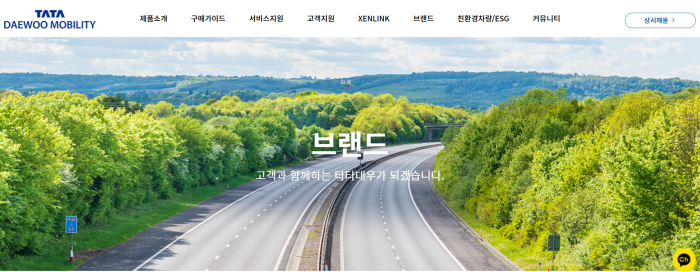
South Korea’s Tata Daewoo Commercial Vehicle Company is rebranding itself as “Tata Daewoo Mobility” to mark its 30th anniversary.
Tata Daewoo held on Wednesday a ceremony at its headquarters in Gunsan, North Jeolla Province, to celebrate its 30th anniversary and unveil the new name.
Originally launched in 1995 as Daewoo Commercial Vehicle, Tata Daewoo changed its name after Tata Motors of India acquired it in 2004. Now, 20 years later, it is rebranding once again.
Tata Daewoo explained that the term “Mobility” in the new name represents the company’s shift from a traditional commercial vehicle manufacturer to a leader in future mobility.
The core objectives of this name change include enhancing the profitability of internal combustion vehicles, developing customized products and advancing next-generation mobility.
The company also introduced a new slogan: “Empower Your Journey.” Tata Daewoo aims to reach global sales of 10,000 units this year, with a goal to exceed 14,000 units by 2028.
The first major move under the rebranded name is the launch of the company’s first electrified model. Tata Daewoo plans to release a medium-duty electric truck called “Gixen” in the first half of next year.

With this launch, the company aims to establish itself as a future mobility enterprise and expand the electric truck market, which is currently limited to 1-ton small trucks.
“Gixen,” which signifies “electric truck with powerful performance,” boasts a maximum power output of 250 kW (335 horsepower) and a peak torque of 862 Nm (88 kgf·m).
Equipped with a high-capacity battery of up to 300 kWh, Gixen achieved the longest driving range for a medium-duty electric truck (480 km) in internal testing, according to Tata Daewoo.
To address concerns about electric vehicle battery fires, Tata Daewoo has introduced a PHASE2 anomaly detection system to enhance the thermal runaway monitoring functions of its Battery Management System (BMS).
Other advanced features include a 3-stage motor system, regenerative braking, the connected car service “XenLink,” an electronic brake system, emergency automatic braking and adaptive cruise control.
“In the future, we plan to expand our eco-friendly vehicle lineup. For medium- to heavy-duty vehicles, we aim to commercialize hydrogen internal combustion engines and hydrogen fuel cell vehicles, offering a realistic and diverse range of eco-friendly products,” said a Tata Daewoo official.
By Jin-Won Kim
jin1@hankyung.com















